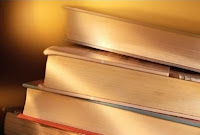 I live in a section of North London called Crouch End (see the photograph above), which will be familiar to fans of Stephen King through his short story and TV drama of that name, in which this really quite harmless little neighborhood is revealed to be a portal to another dimension, or something.
I live in a section of North London called Crouch End (see the photograph above), which will be familiar to fans of Stephen King through his short story and TV drama of that name, in which this really quite harmless little neighborhood is revealed to be a portal to another dimension, or something.It also happens to be the tip of a geographical triangle--Highgate-Crouch End-Stoke Newington--which contains a cluster of historical crime novelists: Andrew Martin, Lee Jackson, Frank Tallis, and me, the new kid on the block. Well, I’m new to historical crime-writing, anyway, though not so new to North London.
I met Lee and Frank during a Crime Through Time event at Heffers Bookshop in Cambridge in February of this year. Lee, the author of a series of Victorian London novels, including The Last Pleasure Garden (2006) and his latest, A Most Dangerous Woman, used his powers of detection (he looked up the bio in one of my books) to discover that I was a North London resident, then very kindly offered me a lift home. Also in the car with me was Frank, the author of Mortal Mischief (2005) and Vienna Blood (2006), both of which are set in early 20th-century Vienna, Austria, and feature the sleuthing duo of Freudian psychoanalyst Max Liebermann and Detective Inspector Oskar Rheinhardt. Lee and Frank share the same publisher (Random House), as do Andrew and I (Faber and Faber). There are other coincidences, some of them spooky enough to almost make me believe that there could be portals to other dimensions. We’re not really a mafia, but we could be.
I caught up recently with Lee and Andrew (author of the highly praised Jim Stringer series, including The Necropolis Railway [2003] and The Lost Luggage Porter [2006])
 to explore what it is about this area that brings out the historical crime in us. Frank was unfortunately busy with other commitments, and could not participate.
to explore what it is about this area that brings out the historical crime in us. Frank was unfortunately busy with other commitments, and could not participate.Andrew Martin surprised me by revealing that he doesn’t actually like living in North London, or London at all, and would prefer a more rural home. North London in particular he finds too prim and politically correct. He claims he writes historical crime fiction as an antidote to the well-ordered, polite, middle-class world of Highgate and environs. In historical fiction, “you can have people smoking!” he explained wistfully. “Wearing one suit all their lives--stuff that you can’t get away with in North London.” He went on: “Part of the attraction [of historical crime fiction] is writing about a world you’d like to inhabit. But also to write the opposite of your real life.” It is this that draws him to darker, horrific subjects that are mercifully lacking in his own day-to-day existence.
Andrew hasn’t always written historical fiction. His first novel was the future-set satire, Bilton (1998), which he followed up with a contemporary crime caper called The Bobby Dazzlers (2001). His historical novels (which include the forthcoming Murder at Deviation Junction) are set during the Edwardian period, and feature the railway detective Jim Stringer. I ask what attracts him to the era. “The clothes,” he exclaimed. “People were better dressed and slimmer, though that may have been due to disease! And there were no mobile phones.”
But there is a more personal motive, too, behind his choice of period and milieu. The Edwardian period was the golden age of the railways. Andrew said that his father used to work for British Rail and was in fact working there at the time of rail’s decline in this country. He was caught up in all the cut-backs and lay-offs--a difficult period, evidently, particularly for a railway enthusiast (Andrew is a member of five historical railway societies). “In some way, setting the novels in the Edwardian period--the heyday of rail--was kind of revenge on my father’s behalf,” he told me.
It’s interesting that both Andrew Martin and Lee Jackson remarked on the difficulty of getting historical vernacular right--and that you can quite often get it right, but people don’t believe it. Said Andrew: “People think people didn’t swear in historical times, but they did. A lot of historical novels have quite a formal style--and that tends to be what people expect. I like to use Edwardian slang, which can sound surprisingly modern and therefore people think I’ve got it wrong, but it’s based on research. I’ve studied confessions in the public domain, you know criminals being interviewed by the police--there’s lots of f-ing and blinding in them, and they have a very modern feel.”
Lee Jackson acknowledged a similar dilemma he faces when penning his Victorian-era novels: “My books are not pastiches of Victorian prose style but I do try hard to have the characters
 speak a realistic Victorian vernacular. And I try not to mention words or phrases that belong in the 20th or 21st century, whether in dialogue or elsewhere. Occasionally, things slip through--a reader wrote to me politely (and correctly), pointing out that ‘burglarising’ was an Americanism. On the other hand, they also suggested that ‘station-house’ (for ‘police station’) was likewise American--not so. In fact, it’s not uncommon for a Victorian phrase to have crossed over to the United States, and meanwhile disappeared in the UK--which can make British readers thoroughly confused! Ultimately, you have to guess what most readers will find plausible. I can generally quote chapter and verse for any vocabulary used--if only from frequent recourse to the OED [Oxford English Dictionary].”
speak a realistic Victorian vernacular. And I try not to mention words or phrases that belong in the 20th or 21st century, whether in dialogue or elsewhere. Occasionally, things slip through--a reader wrote to me politely (and correctly), pointing out that ‘burglarising’ was an Americanism. On the other hand, they also suggested that ‘station-house’ (for ‘police station’) was likewise American--not so. In fact, it’s not uncommon for a Victorian phrase to have crossed over to the United States, and meanwhile disappeared in the UK--which can make British readers thoroughly confused! Ultimately, you have to guess what most readers will find plausible. I can generally quote chapter and verse for any vocabulary used--if only from frequent recourse to the OED [Oxford English Dictionary].”Lee’s passion, or maybe even obsession, for all things Victorian led him to set up his own Web site dedicated to the London of that time. I asked him to explain that site’s birth. “I started the site after finishing my first book, London Dust [2003], when I found I just couldn’t remember where I’d read particular source material, that might be useful for the next book,” Lee said. “I had the idea of simply digitizing anything interesting that I came across--basically, building up an online database of life in Victorian London, from books, journal articles, newspaper cuttings etc. It’s my electronic brain! I think I was also frustrated because I hadn’t found that much of interest on the Internet--so I thought I’d do something about it. Things have changed a little in the past few years, and there are many more useful sites than there used to be ... but I’m proud to say that The Victorian Dictionary is No.1 on Google for all things ‘Victorian London.’ Also, I like the fact that I can maintain it as a free resource--like the Internet was when it started, before money-making became its raison d’etre.”
Lee’s favorite--and most inspiring--place in North London is his local Victorian cemetery, Abney Park. “It was built in the 1840s, a contemporary of the more famous Highgate and Kensal Green. By the 1970s, it had fallen into utter disrepair; now the decay has been halted but not reversed--much of the ground is dense with wild undergrowth, the chapel remains a burnt-out shell. Ironically, it is probably more spectacular in its current state than if it had remained as pristine as the Victorians intended. I’ve used it in two different books--for the burial of a music-hall star, and the grave-robbing of a notorious suicide. … One should make the most of such things.”
I asked both writers if, as readers often think, things were actually better in the past. Lee said: “That depends on your circumstances--possibly for the aristocracy and upper-middle class, but not for the average worker (no pension, no health service, no social security but the workhouse, etc.). In truth, though, I find it hard to be critical of the Victorians--they pretty much invented the modern world: public transport, mass media, social housing ... I won’t bore you with the list! Not to mention that fact that I rather rely on them to make my living!” Andrew’s answer was considerably less equivocal: “Yes!”
(Permission to use the Crouch End photograph is granted under the terms of the GNU Free Documentation License.)

















No comments:
Post a Comment